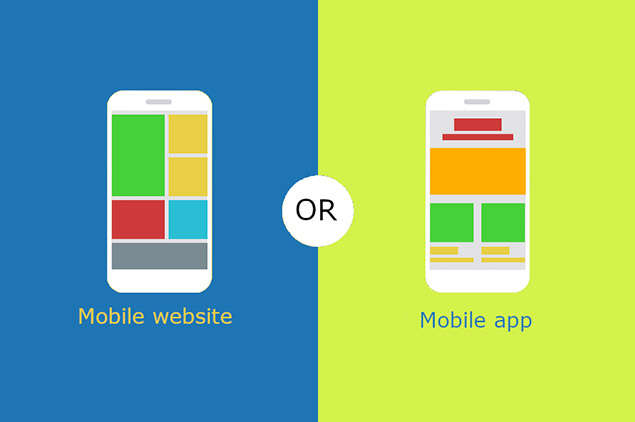
Mobile Website Ove Mobile Apps
These days, businesses face difficulty when deciding on a format for their mobile and smartphone-based products. First considerations that will probably come to their mind is, whether they want a mobile responsive website or a mobile app. Why not both? Both of them offers their own benefits, and one isn’t always better than the other, depending on your business needs.
Let’s get into the details of each option.
Before we check which is better, it’s important to understand the key differences between them. A smartphone such as iPhone or Android can access both apps and mobile websites.
A mobile website is almost like any other website. The only difference is that in mobile responsive website, developers designed your website specifically for mobile screen. URL like “m.example.com” will often house a mobile responsive website. It can also scale to any sized device ranging from desktop to a smartphone. Users can view mobile responsive websites, like any other website.
Mobile apps, however, are very specific applications customized for running on a smartphone. Users install apps on their phone as standalone applications. Users visit a device-specific platform such as Apple’s App Store, Google’s Play Store in order to find and download apps for their phones. This means that mobile applications are only one layout that is seamless and adapts automatically for their specific phone.
Creating mobile responsive websites is an older method. Perhaps even less relevant today. In most cases, the pros of a mobile responsive website are as follows:
Today, mobile-generated traffic contribute to more than half of global web traffic. Mobile apps are becoming a popular choice for a large number of businesses. Because they want to offer users fast and functional design. Mobile apps take longer to create and are generally more expensive, but they offer several other advantages:
Perhaps we should be asking, which is better for you? Most businesses need, and already have, mobile responsive websites these days. While native apps generally perform more efficiently, not every business needs one to be successful.
Are you are planning a mobile strategy for your organization? We can help you make informed decisions with the right project plan to match your goals. You can look at our portfolio here. Please contact us for additional information.
Managing your personal media collection might seem daunting in a world bursting with digital photos,…
As technology evolves, businesses find innovative ways to leverage AI for their payment strategies, offering…
In certain regions, such as India, Google pays special attention to the verification process when…
Introduction In today's digital age, having a robust online presence is crucial for businesses of…
Hey there, aspiring entrepreneurs and startup enthusiasts! We often see the glitz and glam of…
WordPress, the world's leading content management system, now powers nearly every second website across the…